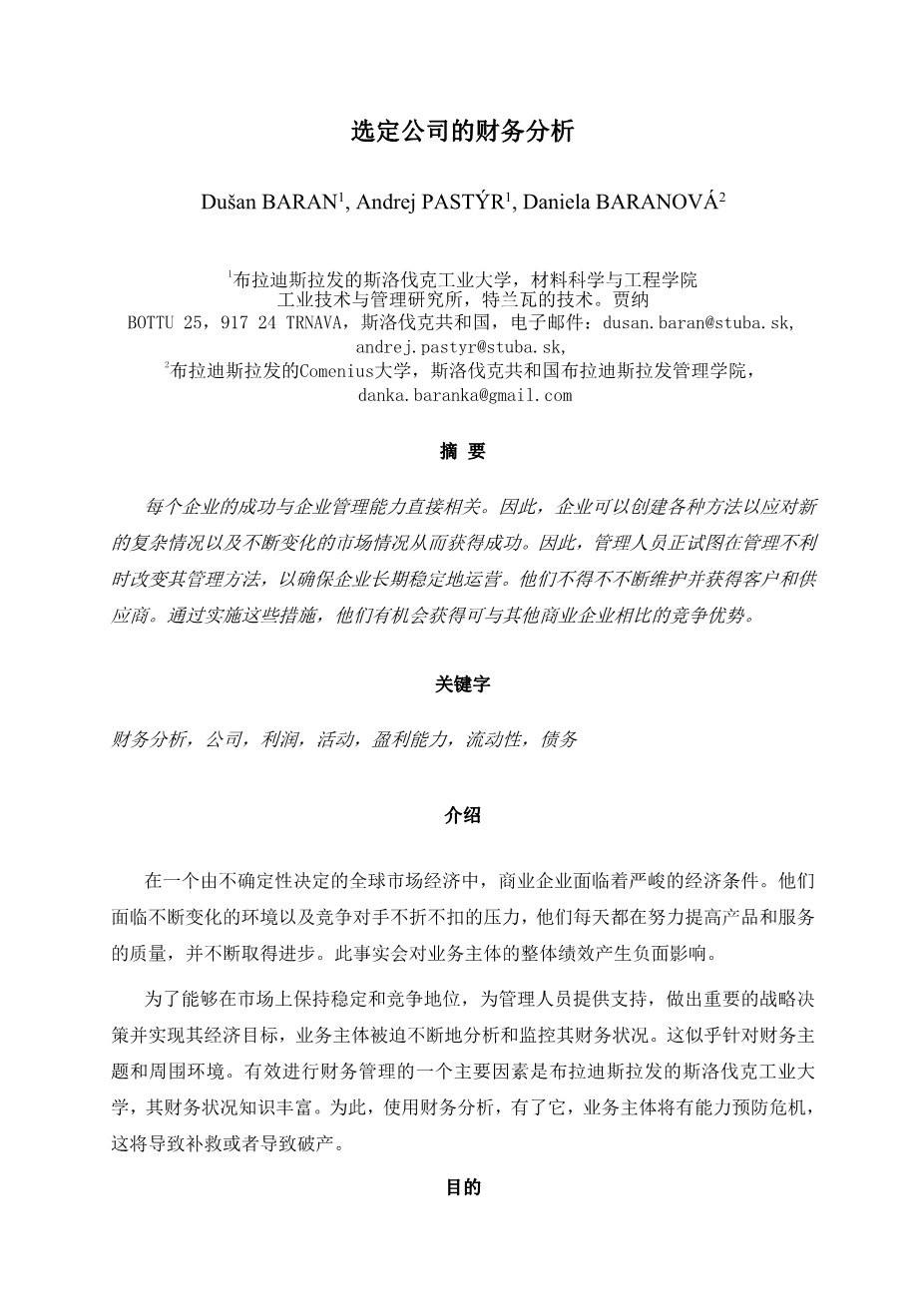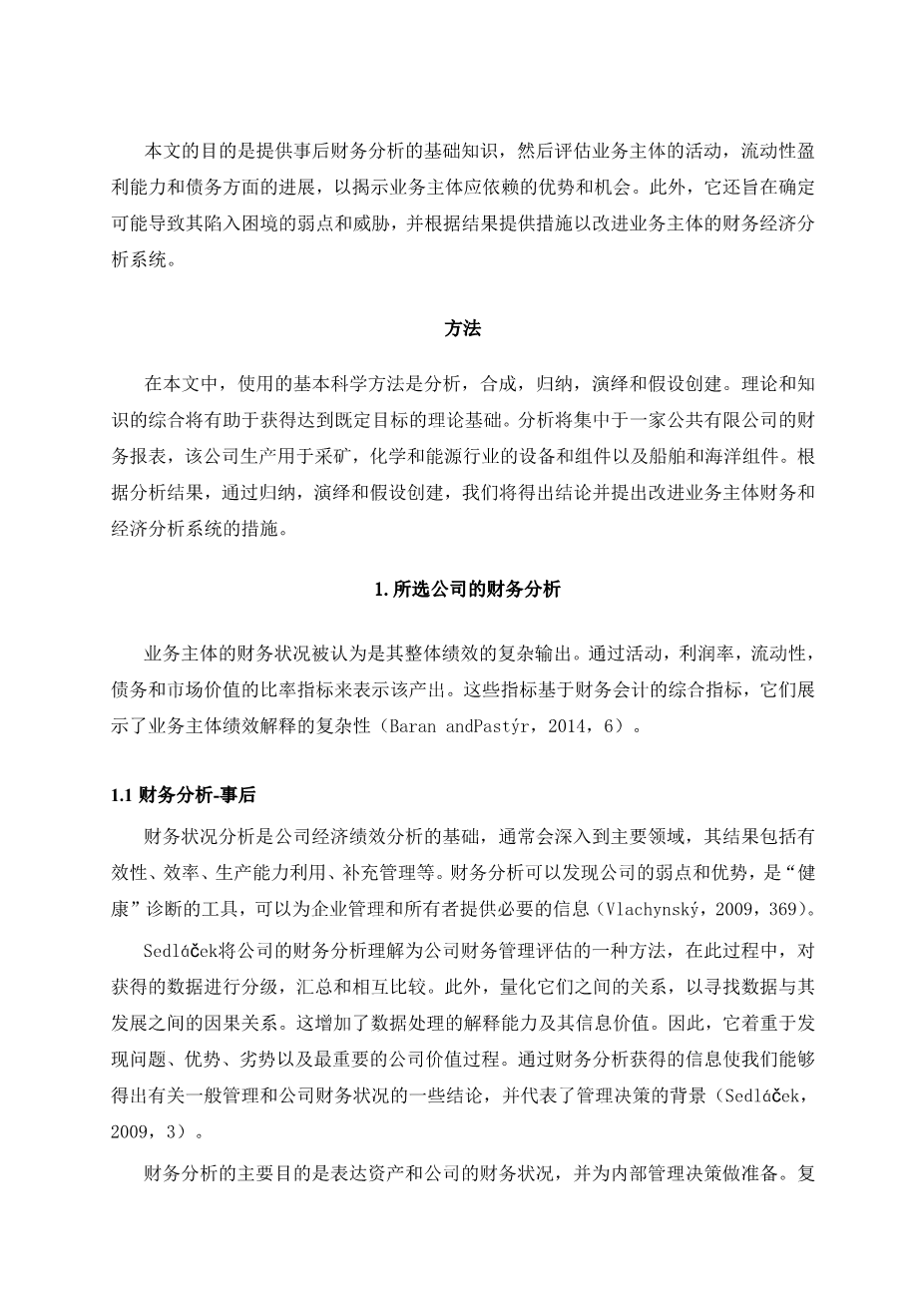选定公司的财务分析外文翻译资料
2023-09-01 10:24:09
10.1515/rput-2016-0008 2016, Volume 24, Number 37
FINANCIAL ANALYSIS OF A SELECTED COMPANY
Duscaron;an BARAN1, Andrej PASTYacute;R1, Daniela BARANOVAacute;2
1 SLOVAK UNIVERSITY OF TECHNOLOGY in Bratislava, FACULTY OF MATERIALS SCIENCE AND
TECHNOLOGY IN TRNAVA, INSTITUTE OF INDUSTRIAL ENGINEERING AND MANAGEMENT, UL. JAacute;NA
BOTTU 25, 917 24 TRNAVA, SLOVAK REPUBLIC, e-mail: dusan.baran@stuba.sk, andrej.pastyr@stuba.sk,
2Comenius University in Bratislava, Faculty of management in Bratislava, Slovak Republic, danka.baranka@gmail.com
Abstract
The success of every business enterprise is directly related to the competencies of business management. The business enterprise can, as a result, create variations of how to approach the new complex and changing situations of success in the market. Therefore managers are trying during negative times to change their management approach, to ensure long-term and stable running of the business enterprise. They are forced to continuously maintain and obtain customers and suppliers. By implementing these measures they have the opportunity to achieve a competitive advantage over other business enterprises.
Key words
Financial analysis, company, profit, activity, profitability, liquidity, indebtedness
INTRODUCTION
In a global market economy that is determined by its constant uncertainty, the business enterprises are faced with demanding economic conditions. They are exposed to constant changes of environment as well as uncompromised pressure of competitors, who are trying every day to increase the quality of their products and services and continuously to progress ahead. This fact results in a negative impact on the whole performance of the business subject.
The business subject, in order to be able to maintain a stable and competitive position on the market, to provide inputs for the management, to make important strategic decisions and to achieve their economic goals, is forced to constantly analyse and monitor their financial situation with which appears towards financial subjects and the surroundingrsquo;s situation. A principal factor of effective financial management consist SLOVAK UNIVERSITY OF TECHNOLOGY in Bratislava, s of financial situation knowledge. For this purpose the financial analysis is used. With it the business subject will be capable to prevent the crisis, which would lead to remediation or even to bankruptcy.
OBJECTIVE
The objective of this article is to provide basic knowledge about financial analysis ex-post and subsequently to evaluate the business subject progress in an area of activity, liquidity profitability and indebtedness, to reveal strengths and opportunities that the business subject should rely on. Furthermore, it also aims to determine weaknesses and threats that could lead them to difficult situations and based on the results to provide measures to improve the system of financial economic analysis of the business subject.
METHODS
In this article the basic scientific methods used were analysis, synthesis, induction, deduction and hypothesis creation. A synthesis of theory and knowledge will serve to obtain the theoretical basis to meet the set objective. The analysis will focus on the financial statements of a public limited company which produces equipment and components for the mining, chemical and energy industries, as well as boat and marine components. From the results of the analysis, by induction, deduction and hypothesis creation, we shall draw conclusions and suggest actions for improvement of the business subjectrsquo;s financial and economic analysis system.
FINANCIAL ANALYSIS OF THE SELECTED COMPANY
The financial situation of the business subject is considered to be a complex output of their whole performance. This output is presented through the ratio indicators of activity, profitability, liquidity, indebtedness and market value. These indicators are based on the synthetic indicators of financial accounting and they demonstrate the complexity of the business subjectrsquo;s performance interpretation (Baran and Pastyacute;r, 2014, 6).
Financial analysis - Ex post
A financial situation analysis is the foundation of the companyrsquo;s economic performance analysis and usually proceeds down to primary fields and results as effectivity, efficiency, production capacity utilisation, supplement management and the like. Financial analysis detects weaknesses and strengths of the company, is the tool of “health” diagnostics and provides essential information to business management and to owners (Vlachynskyacute;, 2009, 369).
Sedlaacute;ček understands the financial analysis of the company as a method of the companyrsquo;s financial management evaluation, during which the data obtained is graded, aggregated and compared to each other. Furthermore, the relationships between them are quantified, looking for the causal connection between the data and their development is determined. This increases the explanatory power of data processing and its informative value. Thus it focuses on identifying problems, strengths, weaknesses and foremost the companyrsquo;s value processes. Information obtained through financial analysis enables us to reach some conclusions about general management and the financial situation of the company and represents a background for management decision making (Sedlaacute;ček, 2009, 3).
The main purpose of financial analysis is to express assets and the financial position of the company and to prepare the inputs for internal management decision making. The complexity and continuous execution are the essential requirements of financial analysis (Hrdyacute;, 2009, 118).
The companyrsquo;s financial situation is diverse and a multifac
剩余内容已隐藏,支付完成后下载完整资料


英语译文共 24 页,剩余内容已隐藏,支付完成后下载完整资料
资料编号:[607162],资料为PDF文档或Word文档,PDF文档可免费转换为Word




